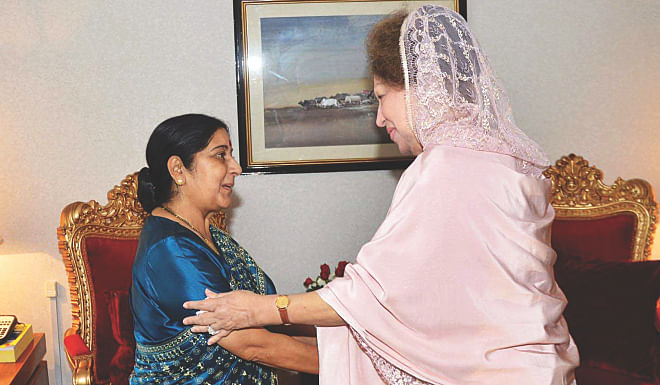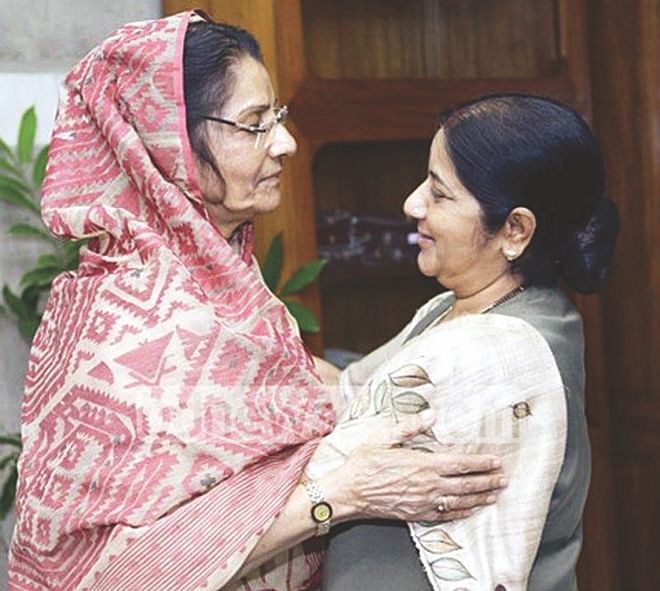No democracy in Bangladesh
No democracy in Bangladesh
Khaleda tells Swaraj; India says internal matters must be settled by Bangladesh people

Meeting Indian Foreign Minister Sushma Swaraj, BNP Chairperson Khaleda Zia yesterday said that there is no democracy in Bangladesh right now and the “so-called” parliament does not represent the people's will.
Khaleda also wanted to know from Swaraj whether India being the largest democracy in the world and a big neighbour of the country wants “such democracy” in Bangladesh, BNP leader Abdul Moyeen Khan, who was present at the meeting, told reporters.
The Indian minister in reply said her government wants to build relations with the people of Bangladesh, not with any particular party or government.
“We want people-to-people contact, which is Saarc's main goal,” Shamsher Mobin Chowdhury, another member of the BNP delegation, quoted Swaraj as saying during the meeting at her Sonargaon Hotel suite.
The BNP, which boycotted the January 5 parliamentary polls, had blamed India for backing the Awami League in holding the election. The AL and its allies secured three-fourth majority through the election and formed government.
Replying to a query whether the BNP sought Indian assistance for arrangement of a midterm election in Bangladesh, Shamsher said the issue did not come up for discussion. “It's our internal matter and our people will settle it."
During the half-an-hour meeting beginning around 10:00am, Khaleda congratulated the new government of India and told the visiting Indian minister that Bangladesh people want deeper relations with India.
“With the election result of India, the ray of hope has arisen among the people of Bangladesh that a new chapter in the Bangladesh-India bilateral issues will open up,” Shamsher quoted Khaleda as telling Swaraj.
According to diplomatic sources, Khaleda at the meeting said her party would never allow Bangladesh territory to be used for terrorist activities against India or any other country.
She also called upon Swaraj to resolve all the pending bilateral issues, including the Teesta water sharing treaty, for mutual benefits.
The Indian minister, who was on the last leg of her maiden visit abroad as the foreign minister, appreciated Khaleda's stance and hoped both the countries would address each other's concern and cooperate for peace, progress and stability.
On pending issues, she assured Khaleda that her government already made some progress, and efforts were on to forge a national consensus about those.
BNP acting secretary general Mirza Fakhrul Islam Alamgir and BNP chairperson's advisers Reaz Rahman and Sabihuddin Ahmed were also in the delegation.
Later, Khaleda and Swaraj held one-to-one talks for 10 minutes.
“The external affairs minister's meeting with Khaleda Zia comes against the backdrop of the Indian government's efforts to reach out to all sections of Bangladesh society,” said another Indian diplomat.
The BNP chief presented a Jamdani sari to the Indian minister, said the meeting sources.
During a briefing at the airport, Indian foreign ministry spokesperson Syed Akbaruddin termed the Swaraj-Khaleda talks as a “courtesy meeting”.
Asked about this meeting, Akbaruddin avoided a direct reply and summarised the outcomes of all the meetings held yesterday instead of being specific about Khaleda's.
“I want to summarise the outcomes of today's discussions. Across the widest spectrum of Bangladesh government and society, there are desire and feeling for greater friendship, greater cooperation and greater interaction with India,” he said.
He also said the internal issues of Bangladesh need to be addressed and resolved by its people.
The BNP chief had to maintain the protocol and come to meet Indian external affairs minister at the latter's Pan Pacific Sonargaon hotel suite since she no longer holds any official position following the January 5 election.
Khaleda, who was either prime minister or leader of the opposition since 1991 to 2013, was in a serious dilemma about meeting Swaraj at the hotel suite, sources say.
The Indian side stuck to maintaining the protocol as Swaraj cannot go to Khaleda's residence or office for the meeting. Finally, the BNP agreed to meet the Indian minister at the hotel.
BNP insiders said the party made a serious mistake by not meeting Indian President Pranab Mukherjee during his first official foreign visit to Bangladesh in March 2013.
Only a year back, Pranab gave a warm welcome to Khaleda Zia at Rashtrapati Bhaban when she went to India at the invitation of Manmohan Singh government.
From that realisation, the party leadership was desperate to meet the external affairs minister in a bid to build trust with India, sources add.

MEETING WITH RAUSHAN
After the meeting with the BNP chief, Indian minister met Raushan Ershad, the leader of the opposition in parliament, at the latter's parliament office around 11:55am.
“It was just a courtesy call. We have discussed several bilateral issues including development in the power sector and different problems between two countries,” Raushan told reporters after the meeting.
The Indian minister also invited her to visit India, she added.
Asked if they discussed the January 5 polls or the country's ongoing political issues, she said they did not.
Later, the two held a closed-door meeting at opposition leader's room.
Sushma Swaraj, who came here on Wednesday night, left yesterday afternoon wrapping up her three-day visit.